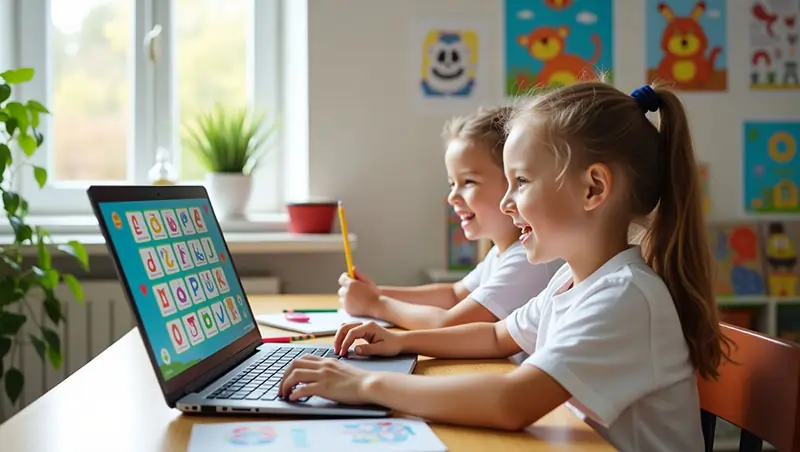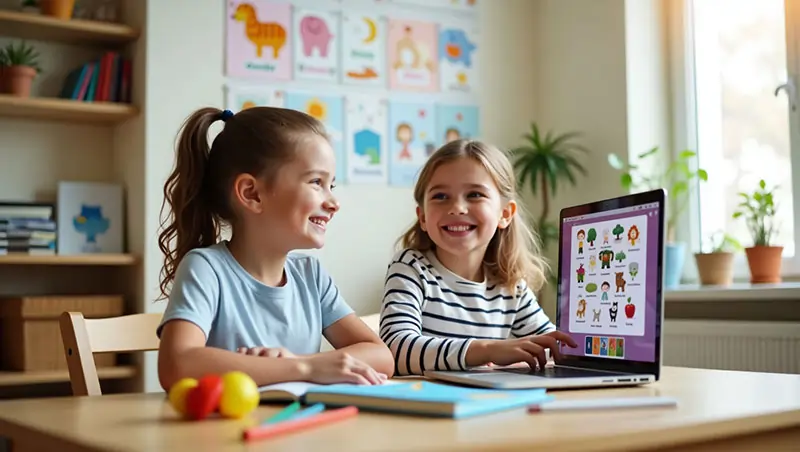Fun And Effective Ways For Kids To Learn English Online
Learning English has never been easier—or more fun in the digital era. Kids may plunge into a vibrant, creative world packed with interactive courses meant to make language learning enjoyable with only a device and an internet connection. There are many fun, interesting, and tech-friendly choices to investigate for parents wishing to assist their kids enhance their English from home.
One can now learn a language outside the conventional classroom environment. Apps and online platforms have turned studying English into a vibrant experience combining enjoyment with knowledge. These creative tools increase confidence, promote communication, and inspire curiosity, in addition to teaching vocabulary and grammar. All the while enjoying themselves, here’s how children can maximize online tools to grow into assured English speakers.
The Power of Playful Learning
Kids typically learn English best when they are enjoying themselves. Online English learning capitalizes on this by providing fun strategies that fit their preferences and learning styles. From vibrant games to animated storybooks, the focus is on maintaining children’s interest and enthusiasm. Children are urged to learn by doing—listening, watching, repeating, and participating rather than memorizing rules and language.
Gamification is among the most efficient techniques. Platforms such as ABCmouse, Lingokids, or Duolingo for Kids transform language acquisition into a game-like experience with incentives, levels, and interactive activities. These apps help kids advance at their own speed and receive badges for work completion so they maintain their motivation. Games enhance vocabulary, pronunciation, spelling, and listening comprehension in a stress-free manner since children are too busy playing to even notice they are learning.
Immersive Storytelling and Videos
Children enjoy stories; teaching English via stories is a well-known approach to improve vocabulary, grammar, and understanding abilities. Vivid graphics, passionate storytellers, and subtitles to follow along in online libraries, YouTube channels, and interactive books all help to bring language to life.
Often including read-along audio capabilities, websites such as Storyberries or applications such as Epic! offer free or subscription-based access to hundreds of English-language children’s books. These resources enable children to link the written word with spoken language, therefore supporting correct pronunciation and sentence construction.
Apart from storybooks, instructional YouTube channels like Super Simple Songs, Cocomelon, or Alphablocks mix music, animation, and repetition to present language ideas in a memorable way. All of these activities improve memory and promote a natural awareness of rhythm and sentence flow by means of singing body movement, and phrase repetition.
Interactive Games and Quizzes
Learning English online doesn’t have to be sedentary. Many educational websites provide interactive quizzes and movement-based games that change according to a child’s ability. These usually combine hues, people, noises, and activities to maintain interest.
Websites such as PBS Kids, Funbrain, and the British Council’s LearnEnglish Kids provide thematic exercises emphasizing daily language skills. For a quick and engaging way to boost vocabulary retention, kids can also try the Google Memory Game, which challenges them to match words with images in a fun, timed setting. These fun activities, whether they involve spotting objects, matching sounds to words, or filling in missing letters, assist kids in strengthening basic English knowledge without having it seem like homework.
Some platforms include speech recognition and real-time comments, going even further. For instance, certain phonics and reading applications will hear children reading out loud and offer soft corrections, so enabling them to gain confidence and enhance pronunciation over time.
Creative Expression Through Art and Music
Creative thinking is a strong weapon for language acquisition. Drawing, making, singing, and dancing all provide significant chances to use English in a stress-free and expressive manner. Digital coloring books, sing-along apps, or art-based language courses allow children to participate in English.
Applications such as Toca Boca or Crayola Create and Play provide easy methods to combine English learning and creativity. Children naturally increase their language and understanding when they follow directions or explain their artwork. While singing along to their favorite songs, music-based apps, and karaoke systems enable children to pick up pronunciation and sentence structures.
Language is about expression, not only speaking. Letting kids mix English with their love of music and art helps to strengthen their relationship with the language in a personal and enduring way.
Virtual English Classes and Conversation Practice

Virtual English classes provide a wonderful choice for more organized learning. Usually offered by qualified teachers who specialize in teaching children, these programs can be one-on-one or group-based. Video chats on platforms like Outschool, Cambly Kids, or Novakid link young students with passionate teachers, so transforming the house into a worldwide classroom.
In these lessons, students not only increase their grammar and vocabulary but also gain practical conversational skills. Skills that are difficult to acquire via solo study are learned by them: asking questions, proper responses, and contextual use of complete sentences. Many courses keep things light and interesting by using games, stories, and songs.
Virtual English clubs or language exchange programs for children are also options for parents who wish their children to learn English by interacting with other people. These let kids interact with classmates from all around and practice speaking in a relaxed, welcoming environment.
Augmented Reality and Voice Technology
Innovative technologies such as voice-activated learning and augmented reality (AR) are shaking up children’s education. Using a phone or tablet camera, AR applications can overlay English words and images on physical items, therefore transforming the real world into a learning environment. For visual and tactile students in particular, this can be quite useful.
Voice assistants such as Alexa or Google Assistant also provide entertaining methods to learn English. All the while using and hearing English in a conversational setting, children can ask questions, play word games, or listen to bedtime stories. These clever technologies enable children to request information or issue commands using natural language and help them improve their listening abilities.
Creating A Positive Home Learning Environment
Although technology offers tools, the environment is also important. Regular routines turn learning become part of daily life; a calm, distraction-free environment promotes concentration. Establishing a specific learning area with enjoyable posters, flashcards, and access to educational tools can let children know that English time is a unique part of the day.
Parents need not be fluent in English themselves to assist their kids. Showing attention, playing games, or commending progress can all help to create confidence and maintain the momentum. Consistent practice of little everyday habits—such as labeling items around the house in English or using basic greetings—can produce significant effects.
Conclusion
Especially when tackled with curiosity, playfulness, and the appropriate digital tools, learning English online can be one of the most fulfilling journeys a child undertakes. From interactive games and vibrant films to creative expression and real-time conversation, there is no lack of enjoyable and efficient ways for children to enhance their English from home. Children remain motivated, involved, and eager to discover the world—one English word at a time by making the process pleasant and tech-friendly.
This is a guest post submitted by qualityguestpost.com


